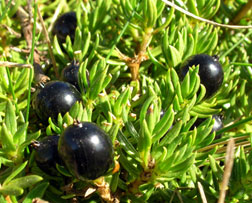
|
In The Garden
Rick Barboza
|
Kukaenene has connection with the nene
Kukaenene
Coprosma ernodeoides
Description: Very cool-looking low shrubs, which in most cases look like ground cover. Although the main look of the plant is herbaceous, to the touch it is stiff and rigid. Tough, tiny, triangular leaves cover thick stems. Small, creamy, yellowish-white flowers develop from within the leaf axis and, when pollinated, form many shiny black fruit, for which this plant is named.
 HUI KU MAOLI OLA
The berries on Kukaenene look like black licorice jellybeans -- and like nene droppings.
|
|
Yup, if you haven't figured it out already, kukaenene means nene poop. Not for the smell, but for the look. Each tiny fruit resembles a black licorice jellybean which also happens to look like the droppings of nene birds.
What's even more interesting is that these fruits are one of the favorite foods of the nene.
Distribution: In the wild this plant is usually found in the subalpine forests of Haleakala on Maui and on the Big Island, in open lava fields between 3,000 and 7,000 feet in elevation.
Landscape use: Surprisingly, this plant does well at our nursery in Kaneohe on Oahu at about a 100 foot elevation. It looks great planted around larger landscaping stones.
Plant kukaenene in full sun, with well-drained soil. It attracts few pests and needs little water.
It also does great in a potted plant on the lanai. The plant is available at the Hilo and Honolulu Home Depots or at Hui Ku Maoli Ola Native Hawaiian Plant nursery. It sells for about $12.
Cultural uses: None that are known, but it is an important component to the ecology of the upper dry forests and subalpine regions of Maui and Hawaii.
It is crucial to protect this plant's habitat, not only for the plant itself, but for other animals that depend on it, such as the endangered nene goose, our state bird.
Tasty tidbit: Other names for this plant include 'aiakanene, leponene, nene and punene.
Rick Barboza co-owns Hui Ku Maoli Ola, a native Hawaiian plant nursery, with Matt Schirman. Contact him at 295-7777 or e-mail
Rick.ck.barboza@gmail.com.
Rick Barboza co-owns Hui Ku Maoli Ola, a native Hawaiian plant nursery, with Matt Schirman. Contact him at 295-7777 or e-mail
Rick.CK.Barboza@gmail.com

